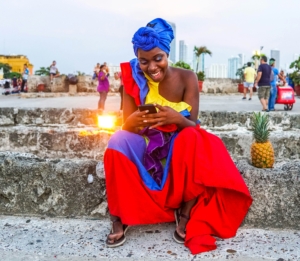Fighting Diseases in Mozambique With an App
 Mozambique, a country in southeastern Africa, has implemented a new digital system and app that helps community health workers in poor and rural areas fight diseases.
Mozambique, a country in southeastern Africa, has implemented a new digital system and app that helps community health workers in poor and rural areas fight diseases.
Community Health Workers in Mozambique
To ensure access to health care for everyone in the country, community health workers serve Mozambique’s more rural and impoverished areas. Community health workers diagnose and treat many diseases in Mozambique, including malaria, pneumonia, malnutrition and diarrhea.
They also provide family planning services, antenatal care, postpartum care and pregnancy tracking. Further, they give healthy children check-ups and follow-up care for patients with tuberculosis and HIV.
What is upSCALE?
upSCALE consists of two different applications. One is an app for supervisors of community health workers. The app allows them to monitor health care workers’ performance and monitor the stock levels of medical and health care supplies. It also allows them to schedule and follow up on supervisory visits.
The second application is designed for community health workers themselves. It features the Mozambique Ministry of Health’s official curriculum. It guides users through treatment, diagnosis, patient referrals, follow-ups, registration and routine health checks.
The program provides community health workers with mobile phones and supervisors with tablets to access the apps. Community health workers receive an initial five-day training on using the app, followed by a two-day refresher each year. Supervisors receive additional training tailored to their role. Between 2017 and 2022, the upSCALE app registered approximately 650,000 patients and supported health care services for more than 200,000.
How upSCALE Helps Fight Diseases in Mozambique
The app was originally developed to improve the quality and coverage of local health care. It aims to address community health workers’ inconsistent adherence to clinical guidelines and the inadequate supply of medications and health supplies. The app has largely been successful in both of these goals. By allowing supervisors to monitor the real-time stock of medication and health supplies, they can ensure that the stock never runs out.
Both apps have also helped the Ministry of Health fight diseases in Mozambique by giving the sector accurate and up-to-date information about the spread of diseases in the country. The information is also disease-specific, allowing the government to make informed decisions about community health interventions.
On a local level, the information enables supervisors to target their interventions and allocate resources more effectively. It has also been valuable for malaria treatment, helping to fill key knowledge gaps in malaria research.
Conclusion
The upSCALE app has proven to be a game-changer in Mozambique’s fight against disease. The country has strengthened health care delivery in underserved areas by equipping community health workers and their supervisors with essential digital tools. With improved adherence to clinical guidelines, real-time data sharing and better resource allocation, upSCALE saves lives and shapes the future of public health in Mozambique.
– Axtin Bullock
Axtin is based in Georgetown, MA, USA and focuses on Technology and Global Health for The Borgen Project.
Photo: Unsplash
